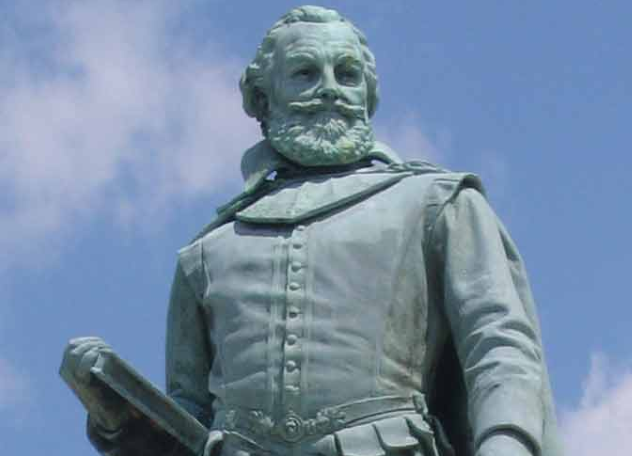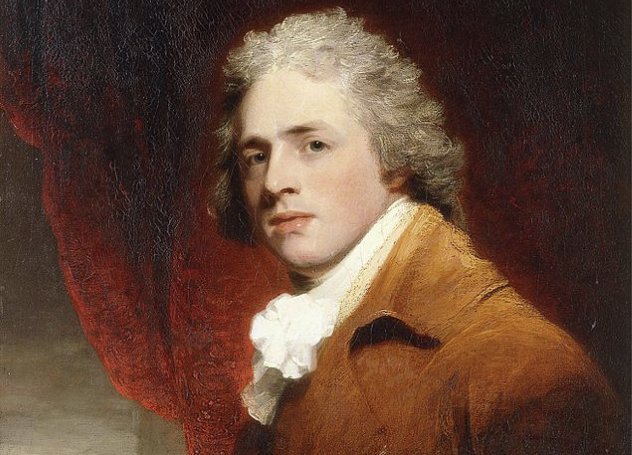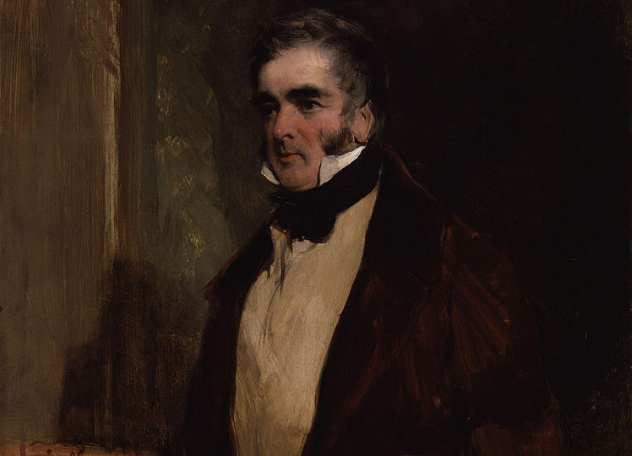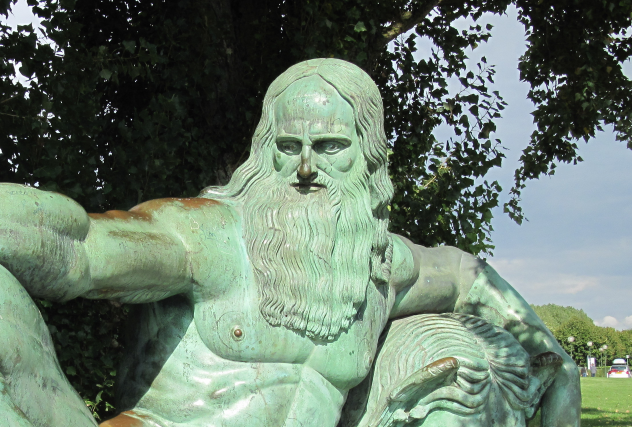 Mysteries
Mysteries  Mysteries
Mysteries  History
History 10 Surprising Stories About the Texas Rangers
 Humans
Humans 10 Philosophers Who Were Driven Mad by Their Own Theories
 Miscellaneous
Miscellaneous 10 Video-Game-Worthy Weapons and Armors from History
 Weird Stuff
Weird Stuff 10 Psychics Who Accurately Predicted Wartime Events
 The Arts
The Arts 10 Pieces of Art Inspired by a Broken Heart
 Health
Health 10 Science Fiction-Sounding New Medical Treatments
 History
History 10 Surprising Facts About the Father of Submarine Warfare
 Space
Space Ten Astonishing New Insights into Alien Worlds
 Weird Stuff
Weird Stuff 10 Bizarre Summer Solstice Rituals Still Practiced Today
 Mysteries
Mysteries Top 10 Haunting Facts About the Ghost Ship MV Alta
 History
History 10 Surprising Stories About the Texas Rangers
 Humans
Humans 10 Philosophers Who Were Driven Mad by Their Own Theories
Who's Behind Listverse?

Jamie Frater
Head Editor
Jamie founded Listverse due to an insatiable desire to share fascinating, obscure, and bizarre facts. He has been a guest speaker on numerous national radio and television stations and is a five time published author.
More About Us Miscellaneous
Miscellaneous 10 Video-Game-Worthy Weapons and Armors from History
 Weird Stuff
Weird Stuff 10 Psychics Who Accurately Predicted Wartime Events
 The Arts
The Arts 10 Pieces of Art Inspired by a Broken Heart
 Health
Health 10 Science Fiction-Sounding New Medical Treatments
 History
History 10 Surprising Facts About the Father of Submarine Warfare
 Space
Space Ten Astonishing New Insights into Alien Worlds
 Weird Stuff
Weird Stuff 10 Bizarre Summer Solstice Rituals Still Practiced Today
10 Of The Most Impressive Acts Of Laziness In Human History
We’re all prone to acts of laziness. Maybe we should be washing the dishes, but we’ve instead elected to get drunk and play foosball. Maybe we’re supposed to be writing another article for the list-based website we work at but have instead fallen asleep face-down in a plate of nachos. Whatever. The point is, every single one of us occasionally indulges our lazy side.
But there’s indulging your lazy side, and then there’s dedicating your life to extreme acts of procrastination. The following people all have one thing in common: They took one look at your average lazy person and decided, “I can do better . . . as soon as I can be bothered.”
10 The Oxford English Dictionary Outdated Itself Before Release

Compiling the Oxford English Dictionary (OED) was always going to be a monumental task. The last word on British English, the complete OED contains around 228,130 words spread over 20 volumes. When it first received a publishing contract in 1879, it was expected to take 10 whole years to compile. But those stumping up the money hadn’t counted on one fatal problem—the ability of academics to procrastinate like a total boss.
Five years into writing the OED’s first complete edition, the compilers had only gotten as far as the word “ant.” This should have been the wake-up call everyone needed to get them working harder. It wasn’t. Instead, 1889 came and went, and those involved were nowhere near the letter “z.” After 10 years, they’d barely edged out the start of the alphabet.
By the time someone finally sat down and wrote the entry for “Zzz,” the 19th century had ended, Queen Victoria had died, World War I had come and gone, jazz had stepped into existence, and the Wall Street Crash was about to hit. It was 1928, and the newly published complete OED was already out of date. Thanks to their epic bout of procrastination, the editors were forced to immediately get started on the second edition.
9 Jamestown’s Colonists Were Too Busy Partying For Executions

One of the guys who helped establish the colony at Jamestown, Virginia, John Smith was also the Englishman who first met Pocahontas, thereby ensuring Disney immortality for himself. He was also extremely unpopular. Twice during his time at Jamestown, his fellow colonists decided to execute him. Twice, they failed.
The first time, Smith escaped when his name was drawn from a locked box that had been sealed before setting sail from England. Those named were the colony’s new governors, and it was thought better to keep him alive. The second time, the lucky Brit escaped not through the divine machinations of fate or thanks to his own quick wits. He escaped because his executioners were too busy partying.
The only survivor of a Powhatan attack, Smith had been blamed and sentenced to hang. At the time, Jamestown was struggling to fend off mass starvation, and the idea of one less extra mouth to feed must’ve seemed pretty tempting. The night of the execution, the whole town gathered . . . only for 100 new settlers to suddenly arrive with much-needed supplies.
In the wild celebrations that followed, the colonists decided to defer Smith’s execution. Only, they never got round to carrying it out. Thanks to their party-hard tendencies, Smith survived to map 4,000 kilometers (2,500 mi) of territory, shaping future explorations of the New World.
8 Richard Sheridan Redefines Missing Deadlines

In the second half of the 18th century, Richard Sheridan was the toast of London. An Anglo-Irish playwright, Sheridan made his name with light comedies such as School for Scandal. He was almost as famous for his procrastination. Sheridan turned missing deadlines into a kind of extreme sport.
We don’t just mean he handed his manuscripts in late. We don’t even mean he handed his manuscripts in at the last possible second. We mean he handed his finished play to the actors for the first time while it was in the middle of being performed on opening night.
Sheridan had already finished the first two acts of School for Scandal and kept promising the actors that they’d get the rest. He kept promising even as he procrastinated, right up until opening night. When it was time to raise the curtain, and it became apparent that Sheridan really hadn’t finished the play, a borderline crazy plan was devised. Sheridan would keep writing as the play went on, rushing lines down to the actors waiting in the wings. So long as he could keep ahead of the performance, the audience would never know.
Incredibly, this ridiculous non-plan worked. School for Scandal became a massive hit, eventually inspiring the plays of Oscar Wilde.
7 The Crematorium Owner Who Made Laziness Terrifying

Imagine, for a moment, that you are a crematorium owner. Now also imagine that your crematorium has just broken. What do you do?
If you said, “Pay to have it fixed,” congratulations—you’re a sane human being. Ray Brent Marsh was evidently neither of those things. When the oven of his Georgia crematorium gave up the ghost in the late 1990s, Marsh decided that it’d be less of a hassle to just secretly bury the corpses in his backyard and give the families urns full of concrete dust so they wouldn’t notice.
That’s right: Marsh was so lazy that he preferred to do the much harder job of digging a pit and burying bodies than the much easier one of picking up the phone and ringing for a crematorium repair guy. He just didn’t just do this once or twice, either. When police finally raided the premises, they found over 320 sets of human remains that had essentially been left to rot. For his epic display of laziness, Marsh was sentenced to 12 years in prison. He’s expected to be released sometime in 2016.
6 Britain’s Laziest Prime Minister

In Britain, class is everything. It’s often said that you can be a talentless no-good, but if you’re born in the aristocracy, you’ll still do well. The case of 19th century prime minister Lord Melbourne proves this. Possibly the laziest man in history, Melbourne became PM by accident and then slept his way through seven years of British history.
In all his long life, Melbourne failed to do pretty much anything. Before becoming prime minister, he’d married the nightmarish Lady Caroline Ponsonby and stayed with her out of sheer lethargy. As he lazed around the house, Lady Caroline went out and had public affairs with men like Lord Byron and then wrote scandalous “tell-all” books about the sex they’d had right under her stupid husband’s nose. It took Lord Melbourne 20 years to get around to divorcing her.
His ascension to the highest office in Britain was no less auspicious. Lord Grey had turned down the post, and Lord Melbourne was the only man the House of Commons’s warring factions could agree on, precisely because he never did anything. In the post, Lord Melbourne spent every single meeting, debate, gathering, and sermon sleeping, usually snoring so loudly that others couldn’t hear themselves speak. Benjamin Disraeli said that he would “lounge away an Empire.” The only reason the lazy PM stayed in office so long was because he had the hots for Queen Victoria, and his post meant that she was obliged to frequently meet him. He was finally replaced in 1841, to the relief of the entire country.
5 The ISIS Jihadi Who Was Too Lazy to Fight

Members of ISIS are many despicable things (callous, cruel, genocidal, anti-Semitic, homophobic), but one thing they’re not is lazy. At least, most of them aren’t. In January 2015, middle-aged Abu Ali crossed from Turkey into Syria to join the death cult. Recruited as a potential jihadist, Ali turned out to be so lazy that he wound up costing the Islamic State money.
There’s a passage in the Quran where Muhammad quite clearly says that if a Muslim doesn’t want to fight, no one can make them. Ali had evidently taken this to heart. When ISIS accepted him into their ranks, Ali demanded a desk job. When they told him to shut up and wage some jihad, he waved the Quran verse at them. Suddenly, ISIS were stuck with a fat, middle-aged idiot whom their own interpretation of Islam forced them to care for.
Over the next few months, Ali chilled out in Syria, watching Rambo on TV and getting fat off the ISIS teat. As carnage unfolded around him, this terminally lazy oddball spent his time downloading music videos and chatting with the jihadists around him. When ISIS finally forced him to go to the front, he invented a medical condition. Eventually, Ali found himself being shunted around from commander to commander, draining resources and driving the terrorists insane with his dedication to living like the Islamic State’s own personal welfare queen.
Finally, those in charge got so fed up with Ali that he began to fear for his safety. He escaped back to Turkey and immediately took up his old life again, having spent four months draining ISIS funds. We can’t tell if he’s genuinely an idiot or a clever undercover plant sent by the CIA to drive some jihadists up the wall.
4 Douglas Adams Procrastinates Right Into Productivity

Douglas Adams is one of the greatest and laziest writers to have ever lived. His Hitchhiker’s Guide to the Galaxy is a seminal book in both sci-fi and British literature. But Adams was famously prone to procrastination. At one point, he gave a Hitchhiker’s book a cliff-hanger ending purely because he couldn’t be bothered to keep typing to the end of the paragraph.
But his greatest act of procrastination undoubtedly came in the mid-1990s. Contracted to do a book called the Starship Titanic, Adams kept putting it off for years on end. Eventually, his procrastination grew so extreme that, according to Terry Jones, he created an entire computer game just to avoid doing work on his novel.
Bear in mind this was the 1990s, when creating a playable computer game in your bedroom was something that maybe only six and a half people could do. Yet Adams still wound up creating a sprawling point-and-click adventure which he triumphantly dumped in front of his publishers as an alternative to writing. His publishers took one look, agreed to release it, and then said that they’d still need the novel. With only five weeks to go, Adams called up Monty Python member Terry Jones and begged him to write it instead. Jones obliged, claiming later that he wrote the whole thing in the nude. (Because why not?)
3 George Akerlof Turns Procrastination Into An Academic Field

Any man can put off doing something for as long as feasibly possible, but it takes a special kind of man to be curious enough about their own laziness to write an academic paper on it. Meet George Akerlof. A respected economist, Akerlof managed to turn his own procrastination into a Nobel Prize–winning career.
The setting is India, and the date is the early 1990s. Akerlof was living on the subcontinent at the time when his friend Joseph Stiglitz came to visit. When his vacation ended, Stiglitz left but forgot to pack some shirts. He asked Akerlof to mail them over to him. Akerlof agreed, only to keep putting it off. He put off mailing the box for eight whole months and finally came to two conclusions: Stiglitz probably no longer wanted to be his friend, and procrastination was something worth rigorous academic study.
The thing was, Akerlof had the best of intentions. He really did mean to send the box, yet he didn’t. His breakthrough was to realize that this strange, irrational action could be applied to behavioral economics. In a 1991 paper called “Procrastination and Obedience,” Akerlof used his own tardiness to make assumptions about how populations might act in certain situations. The academic world went wild.
In the years since, procrastination has become a vast field of study, both within the realm of economics and without. Akerlof went on to win the Nobel Prize in 2001 for his contributions. And Stiglitz, you’ll be happy to know, eventually got his shirts back.
2 Buddha’s Disciple Can’t Be Bothered To Ask Vital Questions

Born before Christ was even a twinkle in Joseph’s eye, Siddhartha Gautama (aka the Buddha) created a global religion, with some 500 million people worldwide adhering to his every utterance. With his words at such a premium, you might expect his disciples to have asked him about everything in minute detail. You’d be wrong. Thanks to the laziness of a guy named Ananda, there are still super-important things that we don’t know about Buddhist vows to this very day.
Toward the end of his life, the Buddha dropped a theological bomb on his disciple Ananda: From then on, the minor vows wouldn’t be needed in ordination, just the major ones. This is kinda like St Peter calling the future pope over and saying, “Know those Hail Marys? I’ve chatted with the big G, and we’ve decided to drop them.” The only problem was, Ananda didn’t know which were the major vows and which were the minor. He deciding that asking could wait for later. He kept on thinking that right until the Buddha died, taking the answer with him.
As a result of this one lazy disciple, no one in the past 2,500 years of Buddhism has had any idea if they’re saying the right vows or not. No one wants to accidentally skip a major one, so they just say the whole lot, painfully aware that a good chunk of it is totally unnecessary.
1 Da Vinci Turns Procrastination into Genius

The Mona Lisa is one of the greatest portraits in history. It’s so iconic that we don’t even have to show you a picture; you can imagine it already. It’s also kind of small: The canvas measures only 76 centimeters (30 in) by 53 centimeters (21 in), about the size of a smallish TV. But given that it’s a masterpiece, you’d probably expect it to have taken a while to paint. How long do you think? Six months? A year?
Try 15 years. For a decade and a half, da Vinci failed to finish his iconic portrait, not because it was so difficult, but because he was so lazy. That’s not us being judgmental. On his deathbed, the great man himself even admitted to his chronic procrastination when he apologized “to God and Man for leaving so much undone.” For comparison, it took Michelangelo a mere four years to paint the entire Sistine Chapel. The area his masterpieces covered? Around 1,100 square meters (12,000 ft2).
But a lazy genius is still a genius, and da Vinci was probably the biggest genius of them all. Although it took him forever to finish artworks (the Virgin of the Rocks took 25 years to finish, from a seven-month commission), he put his procrastination to great use. It was in his downtime that he filled his notebooks with doodles and ideas. Some of those doodles would later turn out to be inventions that could have changed the course of history.
You’ve probably heard that da Vinci invented the helicopter, tank, scuba gear, and parachute. Well, this was when he did it—when he should have been working. Some of the greatest examples of human ingenuity only came about because da Vinci was too lazy to stick with his painting. Remember to tell your boss that next time he catches you binge-watching Game of Thrones when you should be working.








